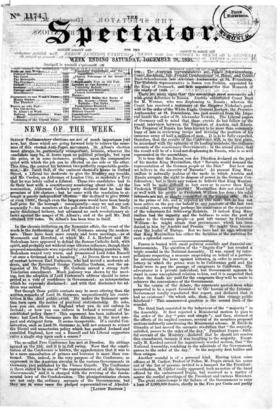In the chronic irritation on the Romanist affair, the event
of the week is the forthcoming of Lord St. Germans among the modera- tors. There have been more county and town nieeteigs,—as at Monmouth and Hereford, at which Mr. I. A. Herbert and Mr. Bodenham have appeared to defend the Roman Catholic faith, with spirit, and probably not without some ulterior influence, though their proposed amendments were rejected by overwhelming numbers. Mr. Bodenham waxed very warm, and pronounced Lord John Russell " at once a firebrand and a humbug." At Devon there was a sort of contest between Earl Fortescue, who had moved a moderate ad- dress, and the Reverend George Cornelius Gorham, erst the an- tagonist of Dr. Phillpotts : Mr. Gorham moved a strong Anti- Tractarian amendment. Much jealousy was shown by the meet- ing, lest the adoption of Lord Fortescue's address should be inter- preted as a vote of confidence in Government ; an interpretation which he expressly disclaimed ; and with that disclaimer his ad- dress was carried.
But though these public contests may be more stirring than the written remarks of Lord St. Germans, unquestionably his contri- bution is the chief public event, Ile makes the Romanist ques- tion turn upon the matter of practical statesmanship. He asks, how you can enforce in England what you do not enforce in Ireland ; or how you can enforce in Ireland a reversal of the established policy there ? This argument has been indicated be- ' fere ; but Lord St. Germans puts the dilemma in the most com- pact and stringent form. It seems insuperable. If a careful Con- thrvative, such as Lord St. Germans is, will not consent to retract ` the liberal and unsectarian policy which has pacified Ireland and ennobled England, how can a Russell and his Liberal supporters enter a single step upon such a course ?


























